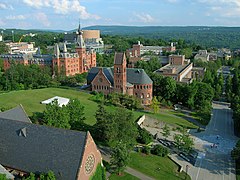Introduction:
Nestled in the picturesque landscapes of Ithaca, New York, Cornell University is a revered symbol of intellectual achievement, forward-thinking leadership, and a lasting legacy. Established in 1865 by Ezra Cornell and Andrew Dickson White, the university’s story weaves together elements of innovation, academic distinction, and profound societal influence. This exploration delves into the various facets that collectively elevate Cornell into the ranks of distinguished higher education.

Campus and Facilities:
Spanning a sprawling 2,300 acres, Cornell’s campus transcends physicality, representing a harmonious blend of tradition and modern design. Architectural aesthetics, embodying the university’s commitment to historical preservation and cutting-edge design, create a visually captivating environment. Home to esteemed institutions such as the College of Arts and Sciences, the College of Engineering, the School of Hotel Administration, and the Johnson Graduate School of Management, Cornell’s facilities are meticulously crafted to foster an environment where education goes beyond conventional boundaries.
Academic Excellence:
At the heart of Cornell’s acclaim lies an unwavering commitment to academic excellence. Offering a diverse array of undergraduate, graduate, and professional programs spanning arts, sciences, engineering, and business, Cornell’s academic portfolio is comprehensive. The esteemed faculty, comprised of distinguished scholars and experts, not only imparts knowledge but also serves as catalysts for transformative thinking and groundbreaking innovation, fostering a legacy of scholarly distinction.
Research and Innovation:
Cornell’s reputation as a center of research excellence is synonymous with pioneering advancements and technological breakthroughs. Boasting an array of cutting-edge research centers and institutes, the university provides an incubator for intellectual exploration and discovery. From trailblazing work in nanotechnology to revolutionary studies in sustainable energy and genomics, Cornell’s research initiatives consistently shape the trajectory of global progress across diverse fields.
Student Life:
The vibrancy of Cornell’s student life is a symphony of diversity and dynamism, curated through a rich tapestry of over 1,000 student organizations. From cultural and artistic endeavors to athletic pursuits and community service, students are presented with an abundance of opportunities for extracurricular engagement. The residential college system further amplifies the sense of community, nurturing intimate relationships within the expansive tapestry of the campus environment.
Cornell in the Community:
Extending its influence beyond academic realms, Cornell is ardently dedicated to community engagement and social responsibility. Collaborative endeavors with local and global communities underscore the university’s commitment to addressing societal challenges and effecting positive change. Public service initiatives, outreach programs, and strategic partnerships with local organizations vividly demonstrate Cornell’s pledge to making a tangible impact on a global scale.
Frequently Asked Questions about Cornell University
1. What is Cornell University known for?
Cornell University is renowned for its academic excellence, diverse range of programs, and pioneering research in various fields. It is particularly recognized for its contributions to agriculture, engineering, business, and the sciences.
2. How large is the Cornell University campus?
The Cornell campus spans approximately 2,300 acres in Ithaca, New York, offering a picturesque setting with views of Cayuga Lake. The campus features a mix of historic and modern architecture.
3. What colleges and schools are part of Cornell University?
Cornell is composed of several colleges and schools, including the College of Arts and Sciences, College of Engineering, School of Hotel Administration, Johnson Graduate School of Management, and many more, each offering a diverse range of academic programs.
4. How diverse is the student body at Cornell?
Cornell prides itself on having a diverse and inclusive student body. Students from various backgrounds and cultures contribute to the vibrant campus community, fostering a rich learning environment.
5. What research opportunities are available at Cornell?
Cornell is a hub for cutting-edge research with numerous research centers and institutes. Students have ample opportunities to engage in groundbreaking research across disciplines, ranging from nanotechnology to sustainable energy.
6. How is student life at Cornell University?
Student life at Cornell is dynamic and vibrant, with over 1,000 student organizations covering a wide array of interests, including arts, sports, community service, and more. The residential college system enhances the sense of community and fosters close-knit relationships.
7. What is Cornell’s commitment to community engagement?
Cornell is actively engaged in community service and social responsibility. The university collaborates with local and global communities, addressing societal challenges through public service initiatives, outreach programs, and strategic partnerships.
8. How can I apply to Cornell University?
Prospective students can apply to Cornell through the university’s undergraduate and graduate admissions processes. Detailed information on application requirements, deadlines, and procedures is available on the official Cornell University admissions website.
9. What is the significance of the Cornell legacy?
The Cornell legacy is characterized by a commitment to education that transcends generations. The university’s impact is seen not only through academic achievements but also in the contributions of its alumni who have shaped various fields worldwide.
10. How can I visit Cornell University?
Cornell welcomes visitors to explore its campus. Information about campus tours, virtual tours, and admissions events can be found on the official Cornell University website. Additionally, prospective students can attend information sessions to learn more about the university.
Conclusion:
In summation, Cornell University emerges not merely as an institution of higher learning but as a beacon of inspiration, relentless innovation, and transformative community impact. Its legacy stands as a testament to the enduring power of education, shaping astute minds, catalyzing groundbreaking discoveries, and crafting legacies that transcend temporal boundaries. As Cornell continues its odyssey, it remains an exemplar of the transformative potential of education, poised to inspire generations to come
